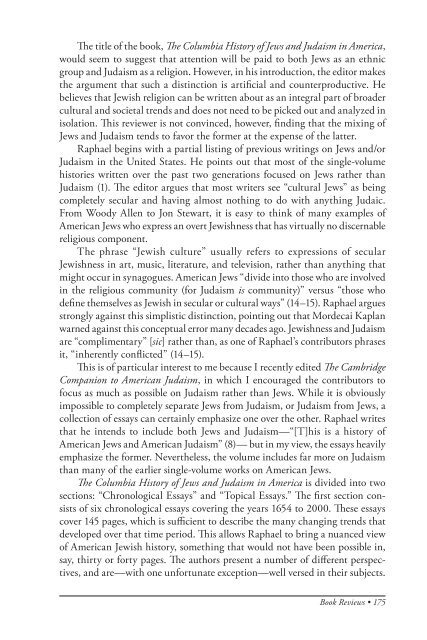The American Jewish Archives Journal, Volume LXI 2009, Number 1
The American Jewish Archives Journal, Volume LXI 2009, Number 1
The American Jewish Archives Journal, Volume LXI 2009, Number 1
Create successful ePaper yourself
Turn your PDF publications into a flip-book with our unique Google optimized e-Paper software.
<strong>The</strong> title of the book, <strong>The</strong> Columbia History of Jews and Judaism in America,<br />
would seem to suggest that attention will be paid to both Jews as an ethnic<br />
group and Judaism as a religion. However, in his introduction, the editor makes<br />
the argument that such a distinction is artificial and counterproductive. He<br />
believes that <strong>Jewish</strong> religion can be written about as an integral part of broader<br />
cultural and societal trends and does not need to be picked out and analyzed in<br />
isolation. This reviewer is not convinced, however, finding that the mixing of<br />
Jews and Judaism tends to favor the former at the expense of the latter.<br />
Raphael begins with a partial listing of previous writings on Jews and/or<br />
Judaism in the United States. He points out that most of the single-volume<br />
histories written over the past two generations focused on Jews rather than<br />
Judaism (1). <strong>The</strong> editor argues that most writers see “cultural Jews” as being<br />
completely secular and having almost nothing to do with anything Judaic.<br />
From Woody Allen to Jon Stewart, it is easy to think of many examples of<br />
<strong>American</strong> Jews who express an overt <strong>Jewish</strong>ness that has virtually no discernable<br />
religious component.<br />
<strong>The</strong> phrase “<strong>Jewish</strong> culture” usually refers to expressions of secular<br />
<strong>Jewish</strong>ness in art, music, literature, and television, rather than anything that<br />
might occur in synagogues. <strong>American</strong> Jews “divide into those who are involved<br />
in the religious community (for Judaism is community)” versus “those who<br />
define themselves as <strong>Jewish</strong> in secular or cultural ways” (14–15). Raphael argues<br />
strongly against this simplistic distinction, pointing out that Mordecai Kaplan<br />
warned against this conceptual error many decades ago. <strong>Jewish</strong>ness and Judaism<br />
are “complimentary” [sic] rather than, as one of Raphael’s contributors phrases<br />
it, “inherently conflicted” (14–15).<br />
This is of particular interest to me because I recently edited <strong>The</strong> Cambridge<br />
Companion to <strong>American</strong> Judaism, in which I encouraged the contributors to<br />
focus as much as possible on Judaism rather than Jews. While it is obviously<br />
impossible to completely separate Jews from Judaism, or Judaism from Jews, a<br />
collection of essays can certainly emphasize one over the other. Raphael writes<br />
that he intends to include both Jews and Judaism—“[T]his is a history of<br />
<strong>American</strong> Jews and <strong>American</strong> Judaism” (8)— but in my view, the essays heavily<br />
emphasize the former. Nevertheless, the volume includes far more on Judaism<br />
than many of the earlier single-volume works on <strong>American</strong> Jews.<br />
<strong>The</strong> Columbia History of Jews and Judaism in America is divided into two<br />
sections: “Chronological Essays” and “Topical Essays.” <strong>The</strong> first section consists<br />
of six chronological essays covering the years 1654 to 2000. <strong>The</strong>se essays<br />
cover 145 pages, which is sufficient to describe the many changing trends that<br />
developed over that time period. This allows Raphael to bring a nuanced view<br />
of <strong>American</strong> <strong>Jewish</strong> history, something that would not have been possible in,<br />
say, thirty or forty pages. <strong>The</strong> authors present a number of different perspectives,<br />
and are—with one unfortunate exception—well versed in their subjects.<br />
Book Reviews • 175

















